The AMD Ryzen Threadripper 3960X and 3970X Review: 24 and 32 Cores on 7nm
by Dr. Ian Cutress, Andrei Frumusanu & Gavin Bonshor on November 25, 2019 9:05 AM ESTCPU Performance: Encoding Tests
With the rise of streaming, vlogs, and video content as a whole, encoding and transcoding tests are becoming ever more important. Not only are more home users and gamers needing to convert video files into something more manageable, for streaming or archival purposes, but the servers that manage the output also manage around data and log files with compression and decompression. Our encoding tasks are focused around these important scenarios, with input from the community for the best implementation of real-world testing.
All of our benchmark results can also be found in our benchmark engine, Bench.
Handbrake 1.1.0: Streaming and Archival Video Transcoding
A popular open source tool, Handbrake is the anything-to-anything video conversion software that a number of people use as a reference point. The danger is always on version numbers and optimization, for example the latest versions of the software can take advantage of AVX-512 and OpenCL to accelerate certain types of transcoding and algorithms. The version we use here is a pure CPU play, with common transcoding variations.
We have split Handbrake up into several tests, using a Logitech C920 1080p60 native webcam recording (essentially a streamer recording), and convert them into two types of streaming formats and one for archival. The output settings used are:
- 720p60 at 6000 kbps constant bit rate, fast setting, high profile
- 1080p60 at 3500 kbps constant bit rate, faster setting, main profile
- 1080p60 HEVC at 3500 kbps variable bit rate, fast setting, main profile
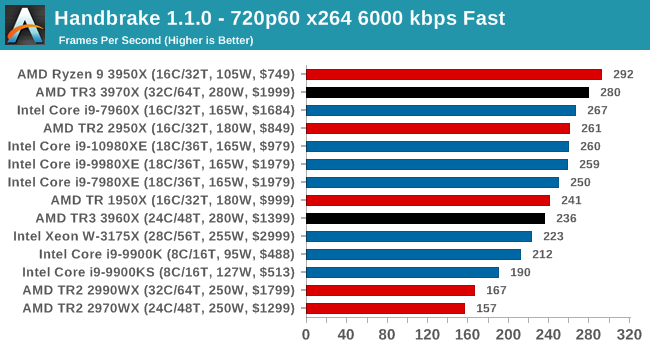
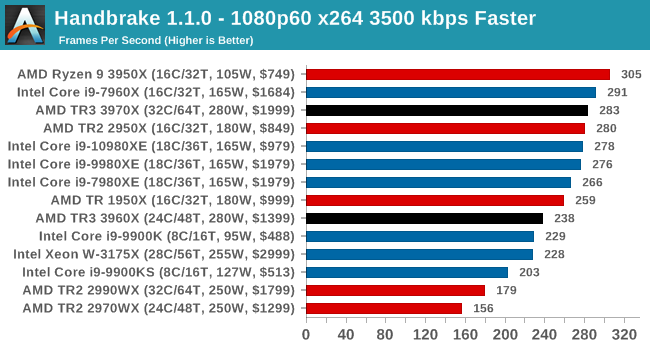
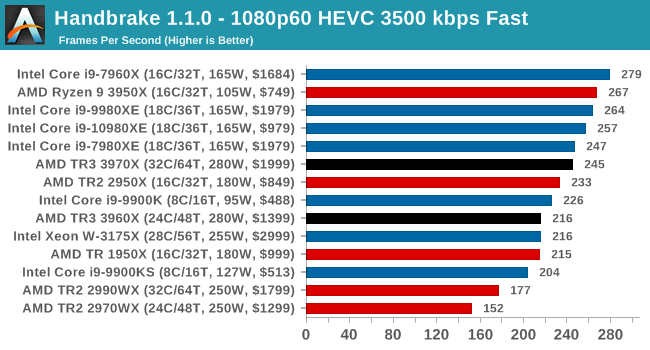
Video encoding is a little varied, based on the variable threaded nature. Certain encoding tests can be more memory sensitive here, or accelerated in different ways, or not scale well with more cores. Either way, TR3 performs a lot better than TR2, but the 3950X seems the best choice.
7-zip v1805: Popular Open-Source Encoding Engine
Out of our compression/decompression tool tests, 7-zip is the most requested and comes with a built-in benchmark. For our test suite, we’ve pulled the latest version of the software and we run the benchmark from the command line, reporting the compression, decompression, and a combined score.
It is noted in this benchmark that the latest multi-die processors have very bi-modal performance between compression and decompression, performing well in one and badly in the other. There are also discussions around how the Windows Scheduler is implementing every thread. As we get more results, it will be interesting to see how this plays out.
Please note, if you plan to share out the Compression graph, please include the Decompression one. Otherwise you’re only presenting half a picture.
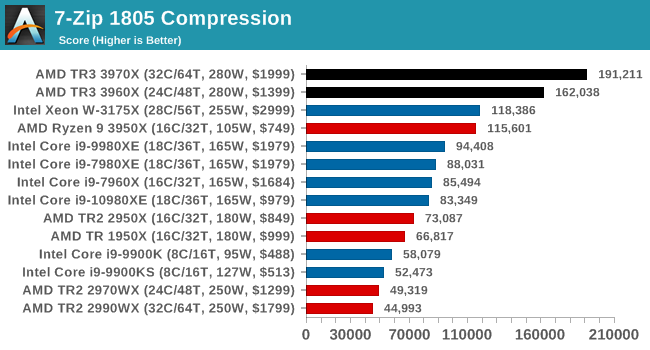
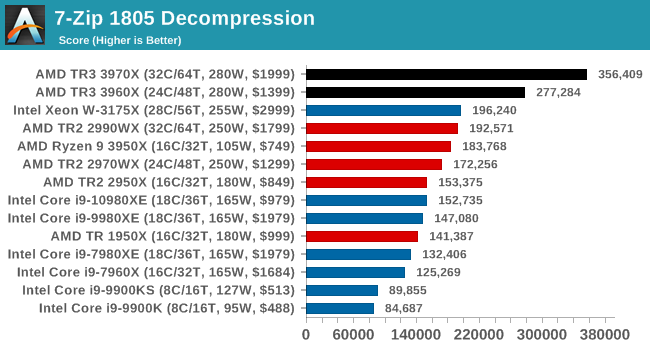
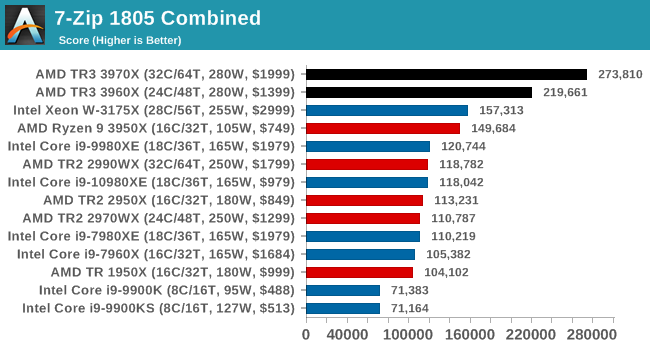
Easily parallel puts the TR3 well ahead of TR2 and Intel.
WinRAR 5.60b3: Archiving Tool
My compression tool of choice is often WinRAR, having been one of the first tools a number of my generation used over two decades ago. The interface has not changed much, although the integration with Windows right click commands is always a plus. It has no in-built test, so we run a compression over a set directory containing over thirty 60-second video files and 2000 small web-based files at a normal compression rate.
WinRAR is variable threaded but also susceptible to caching, so in our test we run it 10 times and take the average of the last five, leaving the test purely for raw CPU compute performance.
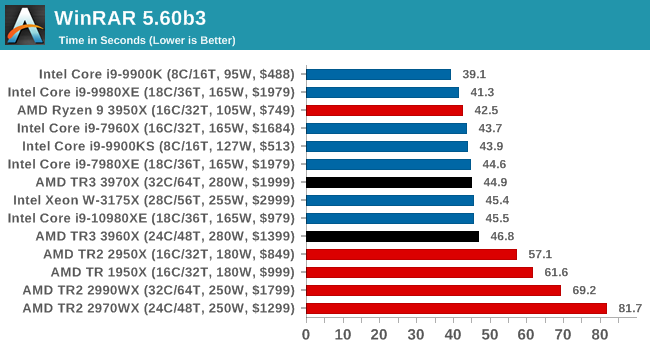
WinRAR is a variably threaded application, and both TR3 processors perform in the same ballpark as anything from Intel. Ideally we should have seen them streak ahead, but we seem to be at a point where CPU frequency or core counts are the limiting factor. At least with Zen 2, there are no issues as there was with Zen 1/Zen+.
AES Encryption: File Security
A number of platforms, particularly mobile devices, are now offering encryption by default with file systems in order to protect the contents. Windows based devices have these options as well, often applied by BitLocker or third-party software. In our AES encryption test, we used the discontinued TrueCrypt for its built-in benchmark, which tests several encryption algorithms directly in memory.
The data we take for this test is the combined AES encrypt/decrypt performance, measured in gigabytes per second. The software does use AES commands for processors that offer hardware selection, however not AVX-512.
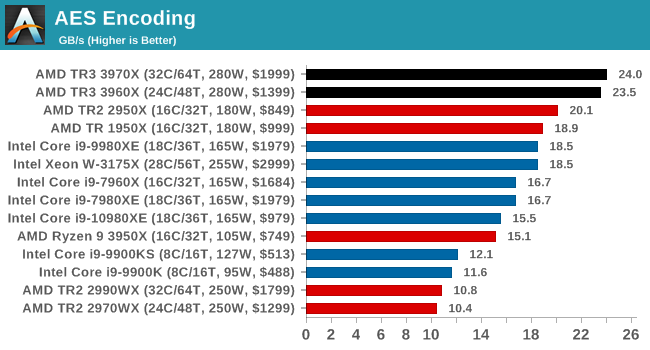










245 Comments
View All Comments
yeeeeman - Monday, November 25, 2019 - link
What is so surprising? It has better ipc and the multi threading efficiency is better than hyper threading in Intel. Hence the result.realbabilu - Monday, November 25, 2019 - link
Wish Goto Openblas optimize Blas on Windows this AMD processor for floating point calculation (especially AVX) otherwise Intel MKL that optimized for Intel processor only is used by most FEA industry like Ansys, Abaqus, Nastran. To get all juice out,it need optimized on how much size cache it got.M O B - Monday, November 25, 2019 - link
Can anyone find these actually for sale anywhere? These reviews look great, but I'm not here for a paper launch.wishgranter - Monday, November 25, 2019 - link
My Quad Xeon 4880 @2,5 Ghz ( 60 cores - 120 Threads ) + 1,5 TB RAM is on same performance as the TR3 3970x !!! at least on Corona Benchmark for now..rahvin - Monday, November 25, 2019 - link
And for consolation you're using about 10X as much power. I bet it costs $20 a day to have that monster on.|Tubbs| - Monday, November 25, 2019 - link
Would have liked to see some visual studio code compile benchmarks. Our developers could use some faster machines imo.TEAMSWITCHER - Monday, November 25, 2019 - link
I'm pretty sure AMD doesn't allow them... They want to skew the benchmark in their favor as much as possible. If you want to play with free hardware .. you have to agree to these things. It would be great if there was a site that didn't play these games... But.. The allure of "free stuff" drives the motivations of everyone in Tech News business.upanddown - Monday, November 25, 2019 - link
I'm pretty sure you've already seen these VC benchmarks? Looking forward for the link to it.Xyler94 - Monday, November 25, 2019 - link
Sites like anandtech usually don't benchmark things like VB code and such. It really has nothing to do with AMD or Intel telling them what to benchmark, it has everything to do with giving a general idea of a processor's performance.When looking at reviews, you should go to the ones who you know benchmark those titles you want. There's not a lot of demand to do VB Code stuff, so no one does it really.
As an aside, Intel suggested reviews don't use Cinebench R15/20 because "It isn't realistic", but it runs on Maxon Cinema 4D, a real and widely used in the professional scene rendering application that studios like Disney and Pixar could use (I don't know if they do). But because no consumer would use such a thing, Intel said don't use it. So would AMD be in the wrong for suggesting not using VB Code? Yes, because Intel shouldn't dictate what reviews use either.
rahvin - Monday, November 25, 2019 - link
Oh please. Butt hurt much?There was a developer studio just a week ago that published benchmarks for switching out just one of their compilation boxes to a Ryzen 3700 and it smoked the other boxes they had by about 40%.